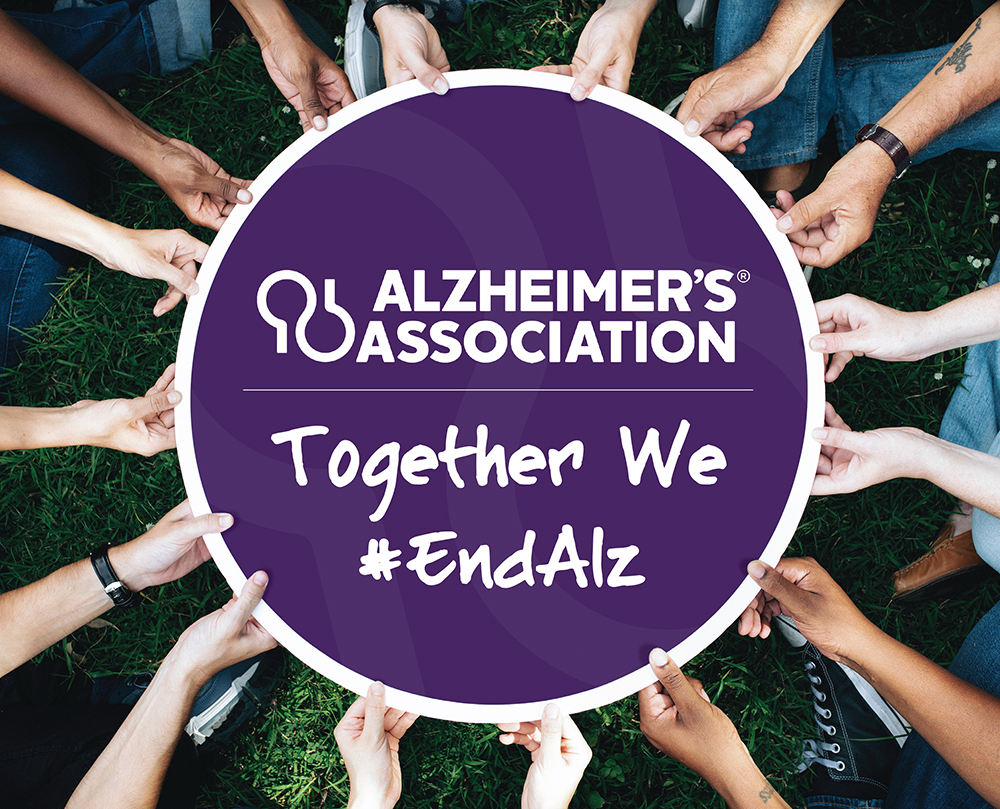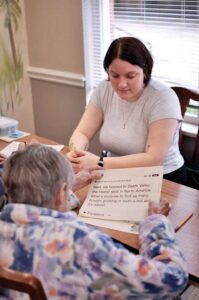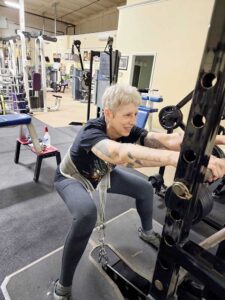By Alexander Germanis
As the summer wind sweeps across the prairies, it carries with it memories of summers past and moments from bygone eras: holiday picnics, family campouts and vacations, moments of happiness and joy with both friends and family.
While these memories can admittedly spark pangs of melancholy in many of us, there is something far sadder and more tragic than not being able to reexperience those moments: not being able to even remember them.
For over six million Americans, those memories are fading fast or gone for good due to the pervasive nature of Alzheimer’s Disease. But the Alzheimer’s Association continues the fight against dementia by raising money for research and care, raising awareness, and by doing whatever it can to preserve those summer memories and the lives of those who strive to hold on to them.
Support, Learning, and Living
Although the actual disease of Alzheimer’s attacks the individual, everyone within that person’s sphere of daily life is affected by it as well. Those at the Alzheimer’s Association understand the necessity of being there not only for those who have been diagnosed, but for their caregivers and loved ones as well.
Helping educate the public on what is being done and what can be done in the battle against dementia is one such way the Association helps. Education programs on a variety of courses ranging from general awareness to caregiver skill-building courses are accessed via webinar, telephone, or in person.
Support groups are also available in a variety of settings and for a variety of specialty groups. Whether you wish to meet in a virtual setting or in-person, if you speak a language other than English, want to meet with just other adult offspring caregivers, or are experiencing the early stages of the disease yourself, there is a support group for you.
“Early-stage services are available through an eight-week support group for those living with early-stage dementia or MCI (mild cognitive impairment),” says Elizabeth Hagemann, Alzheimer’s Association Senior Manager of Education and Community Volunteers for East Central Illinois. “Separate groups for care partners are offered simultaneously.”
“The Alzheimer’s Association Helpline is available around the clock, 365 days a year,” she continues. “Through this free service, specialists and master’s-level clinicians offer confidential support and information to people living with the disease, caregivers, families, and the public.”
Stand Up and Do Something
It is easy to feel crushed or helpless in the face of something as devastating as Alzheimer’s. But first, it is important to remember you are not alone. More than 55 million people in the world live with Alzheimer’s or another form of dementia. June was Brain and Alzheimer’s Awareness Month, and the Alzheimer’s Association uses it as a time to raise awareness. “The more people know about Alzheimer’s, the more action we inspire,” Elizabeth declares.
Aside from wearing purple—the color for Alzheimer’s Awareness—there are numerous annual walks held in more than 600 communities nationwide. “The Alzheimer’s Association Walk to End Alzheimer’s® is the world’s largest fundraiser for Alzheimer’s care, support, and research,” Elizabeth shares. “This inspiring event calls on participants of all ages and abilities to join the fight against the disease. While there is no fee to register for Walk, all participants are encouraged to raise critical funds that allow the Alzheimer’s Association to provide 24/7 care and support and advance research toward methods of prevention, treatment and, ultimately, a cure.”
In the state of Illinois alone, there are 23 Alzheimer’s walks every year. In Central Illinois, two walks take place in the early fall. Saturday, October 1st is The Peoria Walk to End Alzheimer’s, and a week later, on October 8th, is The Bloomington/Normal Walk to End Alzheimer’s. For more information to find out if there’s a walk near you, visit www.alz.org/walk.
There are more ways to join the fight, however. Volunteering at the Alzheimer’s Association can provide vital support for both the people living with Alzheimer’s as well as their families. “Volunteers deliver support and education, raise funds, advocate for Alzheimer’s, and more to help achieve our vision of a world without Alzheimer’s and all other forms of dementia,” Elizabeth says. “Whatever your skills and whatever time you have available, we have in-person and virtual opportunities to provide that support.” More information about these opportunities is available at alz.org/volunteer.
The Fight Goes On
“We have undertaken a multitude of diverse research initiatives,” Elizabeth proclaims. “As the largest nonprofit funder of Alzheimer’s research, the Association is committed to accelerating global progress.”
One such method is a two-year clinical trial being conducted across the country: The Alzheimer’s Association U.S. Study to Protect Brain Health Through Lifestyle Intervention to Reduce Risk (U.S. POINTER). The trial will “evaluate whether lifestyle interventions that simultaneously target many risk factors protect cognitive function in older adults who are at increased risk for cognitive decline,” Elizabeth describes. This is the first such trial in the United States.
Co-funding and leading New IDEAS: Imaging Dementia—Evidence for Amyloid Scanning, the Alzheimer’s Association will enroll 4,000 volunteers, comprised evenly of Latinos and Blacks, in clinics across the country. “The goal of the study is to determine if using a brain amyloid PET brain scan helps clinicians provide a more accurate diagnosis and make better treatment decisions that inform or change a patient’s treatment plan and improve their quality of life,” explains Elizabeth. New IDEAS includes a biorepository to validate new genetic and blood biological markers (biomarkers) that are applicable and accurate for a diverse, ‘real world’ population.”
To better develop treatments for both, LEADS (Longitudinal Early-Onset Alzheimer’s Disease Study) is comparing early-onset Alzheimer’s with the more common, late-onset type.
Sharing data and communicating is key to any successful struggle. The network known as World Wide FINGERS (WW-FINGERS), shares experiences, harmonizes data, and plans joint international initiatives to reduce risk of cognitive impairment or dementia.
In a similar effort of information sharing, the Global Alzheimer’s Association Interactive Network (GAAIN) offers open access to more than 465,000 clinical records from researchers across four continents. “By linking scientists, projects, and data, GAAIN is transforming the exchange of information on an international scale,” states Elizabeth. More information can be found at alz.org/research.
Be Forewarned
Any battle is better fought with a better understanding of the enemy one is facing. That is why it is so important to be able to recognize the symptoms of Alzheimer’s and other dementia. Here are the 10 most common symptoms.
1) Memory loss that disrupts daily life
2) Challenges in planning or solving problems
3) Difficulty completing familiar tasks
4) Confusion with time or place
5) Trouble understanding visual images and spatial relationships
6) New problems with words in speaking or writing
7) Misplacing things and losing the ability to retrace steps
8) Decreased or poor judgment
9) Withdrawal from social activities
10) Changes in mood and personality
“If you notice any of them, don’t ignore them,” Elizabeth pleads. “Schedule an appointment with your doctor.” More information can be found at www.alz.org/alzheimers-dementia/10_signs.
A World Without Alzheimer’s
Whether through research, raising money, or raising awareness, there are myriad ways to fight against a disease that attacks the very thing that truly makes us individuals: the sum of our experiences and memories.
Just as we can all be affected, we can all do something, as Elizabeth will attest. “I joined the Alzheimer’s Association as a volunteer after my grandmother passed with Alzheimer’s disease in 2014,” she shares. “It was during this time that I truly realized how much my beliefs aligned with the Association’s mission and vision of a world without Alzheimer’s.”
“I often say the best part of my job is helping volunteers realize their potential to make a difference as they help empower others affected by this disease,” she concludes. “I love working towards this goal with our wonderful, motivated volunteers!”
Elizabeth is joined by millions of others across the country and around the globe in standing up to achieve the same goal: to live in a world free of Alzheimer’s disease. Will you join them?
If you have been diagnosed with Alzheimer’s or a related disorder, you are not alone. Pre-screening is required. Call Olivier Kah at (309) 282-6656 or email [email protected]. To reach the 24/7 Helpline, please call (800) 272-3900.
For additional informative and inspirational articles, visit 50 Plus News and Views Greater Peoria Area online edition today.










